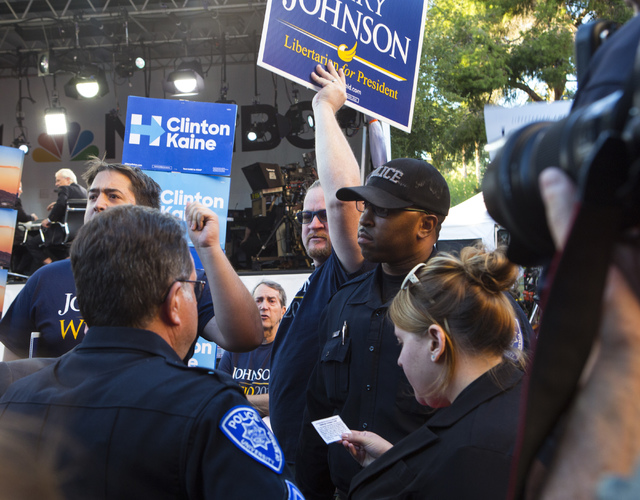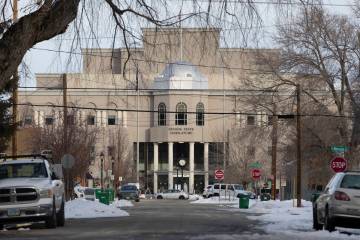EDITORIAL: Entire outdoor area of UNLV should be a ‘free-speech zone’
For years, UNLV drew the lowest rating — a “red light” — from the Foundation for Individual Rights in Education, a watchdog group that monitors a school’s commitment to the First Amendment and free speech on campus. Finally, in 2015, the university shook the red light by amending its statement on diversity, which had prohibited “disrespect” — a highly subjective measure that could be used to silence speakers.
Unfortunately, UNLV officials apparently believe the yellow-light rating is adequate and have shown little interest in earning FIRE’s green-light status and becoming a truly elite school — among the less than 30 nationwide, out of more than 400 rated.
Instead, problems remain.
As the Review-Journal’s Natalie Bruzda reported this week, the school officials imposed rules during the recent presidential campaign designed to keep debate orderly. But that led to fractious discourse and left some students wondering where they could speak freely and safely.
For instance, UNLV’s rule limiting student activism to its designated “areas for expressive activity” — several spaces throughout the campus outlined in university policy — is an obvious infringement on the First Amendment. These areas — hilariously referred to as “free-speech zones” — were also designated as the only meeting places for politically affiliated groups leading to the Oct. 19 presidential debate between Republican Donald Trump and Democrat Hillary Clinton.
The university has since updated its policy for expressive activity areas to grounds open to the public, which it defines as outdoor areas of the campus (lawns, patios, plazas) that are at least 20 feet from the entrances/exits of campus buildings and parking lots, and that do not restrict movement on campus walkways.
That certainly sounds like an improvement. But Gary Peck, a longtime local civil liberties advocate, correctly notes the so-called expressive activity areas are still unreasonable. “The entire outdoor area of a university ought to be considered and treated as a free-speech zone,” he said.
Exactly. And that should ring especially true at a public institution that would cease to exist without taxpayer dollars and boatloads of government-funded grants and government-backed student loans.
Furthermore, limiting free speech to outdoor spaces runs entirely counter to what should be the overarching purpose of a university: encouraging the free exchange of ideas.
UNLV could put an end to this debate and show its commitment to the First Amendment by eliminating its arbitrary and ambiguous speech code. That would put the university, which has long wanted to be considered a top-tier institute, among a group that includes such schools as Duke, the University of Chicago, Purdue and, a little closer to home, Arizona State and the University of Utah.
The answer to speech you don’t like is more speech. The sooner UNLV learns that, the better.

















